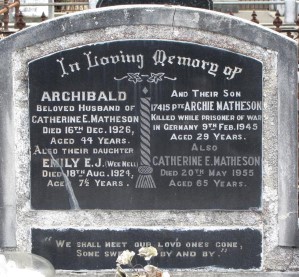Archie Matheson, as he was known, died in Germany but is commemorated in Egypt and Invercargill. Behind that lies a complicated and tragic story.
Archie was a Private in the 26th Battalion, New Zealand Infantry, and was fighting in the same battle in the North African desert that claimed the lives of Myles Matheson and Alex Mathieson in November 1941. Archie went missing in battle, and though we don’t know exactly what happened to him, contemporary accounts give us clues. In fighting at Sidi Rezegh around 30 November 1941, the 26th battalion lost nine officers and 217 other ranks as prisoners of war. Archie was one of them.
In mid-December 1941 newspapers in New Zealand reported him missing, believed taken prisoner, and in February 1942 he was confirmed as being a prisoner of war. His family endured almost two and a half years with Archie as a POW, and with the end of the war in sight in early 1945 they would have been looking forward to his return. But that was not to be.
Archie was killed in Germany on 9 February 1945, and a fellow Kiwi later wrote to his mother with details of the tragic events that we now call ‘friendly fire’. Arthur Harrop of Dunedin was in the same battalion as Archie but wasn’t captured until nearly a year later, and ended up in the same POW camp at Gorlitz in Germany, now on the border with Poland.
“I was on the same working commando as your son Archie and with him on the morning Friday February 9th on which he was killed … The Russians attacked the village of Ruchenualdan at about 7 a.m. when it was still dark and the Germans rounded up all the fit men about 37 of us and marched us out at the same time. We were marching single file alongside the railway line just past the station when a tank came along the road 50 yards away and stopped. Owing to the half light and thinking it was a German tank nobody took any notice of it when all of a sudden it opened fire on us with a machine gun. Archie and the other boys that were killed were in the front and received the first burst — the rest of us were diving for cover. The tank after firing a few more bursts when back to the village — it was a Russian tank!
“Everyone then made a dive over the railway line and made for cover and that is when about 16 of us scattered and hid out and gave ourselves up to the Russians later on in the day. The others were taken on into Germany by the guards.
“I got separated from the rest and never met up with them till I got to Poland about a fortnight later where I first heard of the death of Archie … it came as a shock because I never knew that anybody had been hit. Archie died the same day and was buried by our boys in the garden of the civilian house where they had been taken.
“I want you to accept my heartfelt sympathy in the loss of your son Archie. He was liked and respected by all on the ‘commando’ and he was always helping the boys out doing jobs in the tailoring lines etc. I am afraid Mrs Matherson I am a poor hand at expressing my feelings on paper — but the least I can say is that we have lost a great pal and comrade. If there is anything I can do in the way of information or in any other way I can help I am only to willing to do so.”
Archie was the son of Archibald McArthur Matheson and Catherine Elizabeth Matheson (née Cockroft). When he enlisted he was single and living at home in Invercargill, and working as a warehouseman. He is remembered on the Alamein Memorial in Egypt and a family grave in Invercargill’s east cemetery.
Sources:
Photo of headstone: Invercargill District Council
Photo of Alamein memorial plaque: New Zealand War Graves Project.



Hi John. Thanks for your comment; it’s nice to know that these stories somehow reach family members. You might also like to see this article about your wider family, which mentions your parents. Any further information you have would be appreciated.
http://www.clanmatheson.org.nz/clan-matheson/matheson-place-names-in-new-zealand/matheson-road-waikaka/
Oh thanku so much for printing the letter describing my Uncles death in Germany at the end of the 2and WW. My Mum Heather Maxted nee Matheson was told it was friendly fire but thought that ment English Army. Thanks from Francis JOHN Maxted